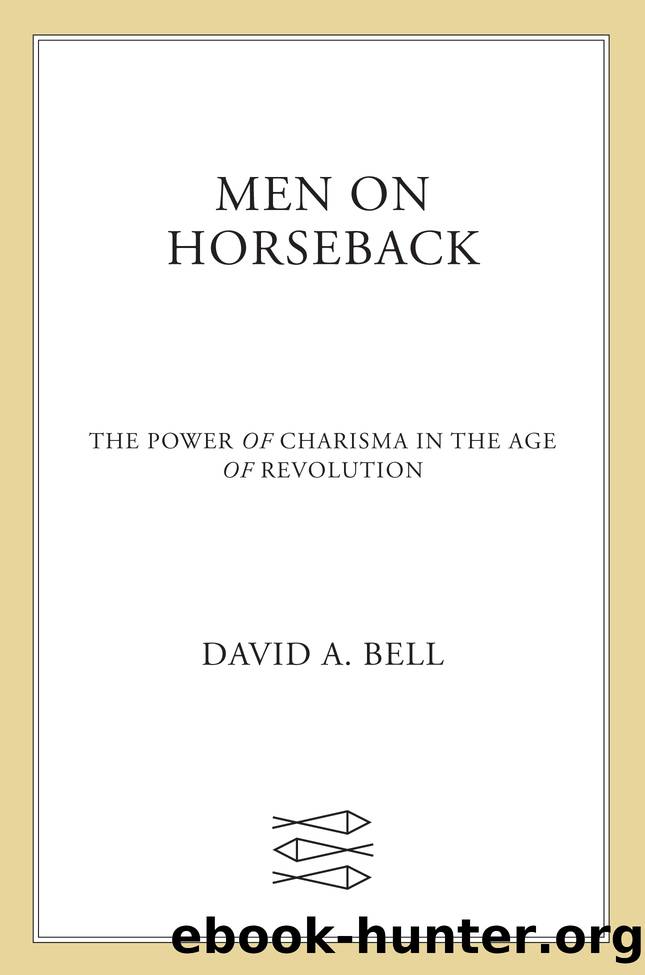Men on Horseback--The Power of Charisma in the Age of Revolution by David A. Bell

Author:David A. Bell
Language: eng
Format: epub
Publisher: Farrar, Straus and Giroux
In a Washingtonian gesture, Bolívar ostentatiously declared that he would resign both from the Peruvian dictatorship and the Colombian presidency. In both countries, the legislative bodies refused to agree. In a distinctly un-Washingtonian gesture, Bolívar graciously deferred to their wishes.85
There was one nation left to liberate: what the Spanish had called Upper Peru, mountainous home to the fabulous silver mines of Potosí and an impoverished, largely Indian population. At the start of 1825, Sucre took his army there and fought a campaign culminating, on April 1, with one final victory. The Spanish-American wars of independence were now complete. In just a quarter century, Spain had lost all its vast mainland American empire to the new nations, although it still retained Caribbean island colonies—most importantly, Cuba. So great was Bolívar’s standing as liberator of the continent that Upper Peru’s leaders (who also had much to gain from flattering him) immediately changed the country’s name to Bolivar, soon modifying it to Bolivia. By this date, the United States had of course named its capital and many other places after George Washington. In the 1790s, a department in Saint-Domingue had taken the name of Toussaint Louverture. But neither of these men, or Bonaparte, had given their name to an entire country.
Not only was Bolívar the metaphorical father of this new country, he was also its lawgiver, and the constitution he personally designed for it clearly shows how his political thought had continued to evolve in an authoritarian direction. Although Bolivia would have a government divided into different branches, one branch would tower above the others: a powerful presidency whose occupant would serve for life, with the ability to choose his successor. Bolívar did not want the Bolivian presidency for himself—he saw his protégé Sucre in the role—but he hoped that the other new South American states would adopt the Bolivian constitution as the blueprint for their own governments. He took great pride in it, personally writing a circular explaining its benefits and having no fewer than five editions printed and distributed throughout the continent.86 Although Bolívar continued to profess, throughout his life, his admiration for Britain and its moderate, parliamentary system of government, the Bolivian constitution looked much more like Alexandre Pétion’s in Haiti, or like Bonaparte’s 1802 charter for a so-called life consulate.87 It also included his long-standing proposition for a branch of government responsible for upholding public morality.
With the liberation of Peru and Bolivia, Bolívar had reached the peak—the Chimborazo, so to speak—of his career. His friend José Joaquín Olmedo, at his request, composed an epic poem on his Peruvian triumphs to serve as a sort of South American Aeneid, celebrating the birth of a new nation. The poem hailed Bolívar as the continent’s Aeneas and also as a successor to the Incas.88 Yet even as it appeared, Bolívar’s charismatic authority already showed signs of fracturing. Even before leaving for Peru, he had been forced to suppress a small revolt in New Granada. After his victories in Peru, he dreamed of
Download
This site does not store any files on its server. We only index and link to content provided by other sites. Please contact the content providers to delete copyright contents if any and email us, we'll remove relevant links or contents immediately.
| Anarchism | Communism & Socialism |
| Conservatism & Liberalism | Democracy |
| Fascism | Libertarianism |
| Nationalism | Radicalism |
| Utopian |
The Secret History by Donna Tartt(16607)
The Social Justice Warrior Handbook by Lisa De Pasquale(11485)
Thirteen Reasons Why by Jay Asher(7782)
This Is How You Lose Her by Junot Diaz(5753)
Weapons of Math Destruction by Cathy O'Neil(5029)
Zero to One by Peter Thiel(4816)
The Myth of the Strong Leader by Archie Brown(4785)
Promise Me, Dad by Joe Biden(4440)
Stone's Rules by Roger Stone(4412)
Beartown by Fredrik Backman(4403)
How Democracies Die by Steven Levitsky & Daniel Ziblatt(4392)
The Fire Next Time by James Baldwin(4336)
100 Deadly Skills by Clint Emerson(4070)
A Higher Loyalty: Truth, Lies, and Leadership by James Comey(4024)
Rise and Kill First by Ronen Bergman(4008)
The David Icke Guide to the Global Conspiracy (and how to end it) by David Icke(3875)
The Farm by Tom Rob Smith(3869)
Secrecy World by Jake Bernstein(3773)
The Doomsday Machine by Daniel Ellsberg(3725)
